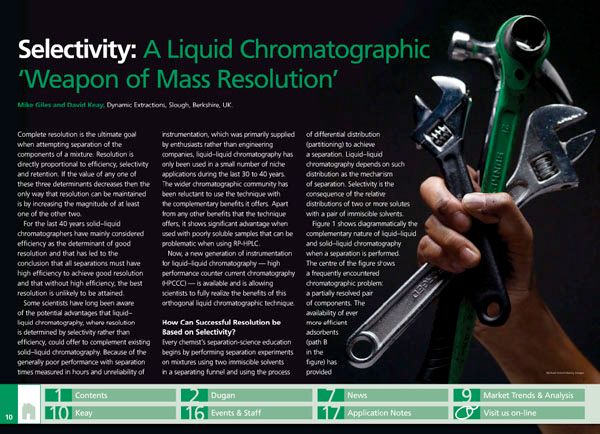Selectivity: A Liquid Chromatographic 'Weapon of Mass Resolution'
A new generation of instrumentation for liquid-liquid chromatography is available and is allowing scientists to fully realize the benefits of this orthogonal liquid chromatographic technique.
Complete resolution is the ultimate goal when attempting separation of the components of a mixture. Resolution is directly proportional to efficiency, selectivity and retention. If the value of any one of these three determinants decreases then the only way that resolution can be maintained is by increasing the magnitude of at least one of the other two.
For the last 40 years solid–liquid chromatographers have mainly considered efficiency as the determinant of good resolution and that has led to the conclusion that all separations must have high efficiency to achieve good resolution and that without high efficiency, the best resolution is unlikely to be attained.
Some scientists have long been aware of the potential advantages that liquid–liquid chromatography, where resolution is determined by selectivity rather than efficiency, could offer to complement existing solid–liquid chromatography. Because of the generally poor performance with separation times measured in hours and unreliability of instrumentation, which was primarily supplied by enthusiasts rather than engineering companies, liquid–liquid chromatography has only been used in a small number of niche applications during the last 30 to 40 years. The wider chromatographic community has been reluctant to use the technique with the complementary benefits it offers. Apart from any other benefits that the technique offers, it shows significant advantage when used with poorly soluble samples that can be problematic when using RP-HPLC.
Now, a new generation of instrumentation for liquid–liquid chromatography — high performance counter current chromatography (HPCCC) — is available and is allowing scientists to fully realize the benefits of this orthogonal liquid chromatographic technique.
Determining Enhanced Sensitivity to Odors due to Anxiety-Associated Chemosignals with GC
May 8th 2025Based on their hypothesis that smelling anxiety chemosignals can, like visual anxiety induction, lead to an increase in odor sensitivity, a joint study between the University of Erlangen-Nuremberg (Erlangen, Germany) and the Fraunhofer Institute for Process Engineering and Packaging (Freising, Germany) combined behavioral experiments, odor profile analysis by a trained panel, and instrumental analysis of odorants (gas chromatography-olfactometry) and volatiles (gas chromatography-mass spectrometry).
Investigating 3D-Printable Stationary Phases in Liquid Chromatography
May 7th 20253D printing technology has potential in chromatography, but a major challenge is developing materials with both high porosity and robust mechanical properties. Recently, scientists compared the separation performances of eight different 3D printable stationary phases.
Detecting Hyper-Fast Chromatographic Peaks Using Ion Mobility Spectrometry
May 6th 2025Ion mobility spectrometers can detect trace compounds quickly, though they can face various issues with detecting certain peaks. University of Hannover scientists created a new system for resolving hyper-fast gas chromatography (GC) peaks.

.png&w=3840&q=75)

.png&w=3840&q=75)



.png&w=3840&q=75)



.png&w=3840&q=75)




